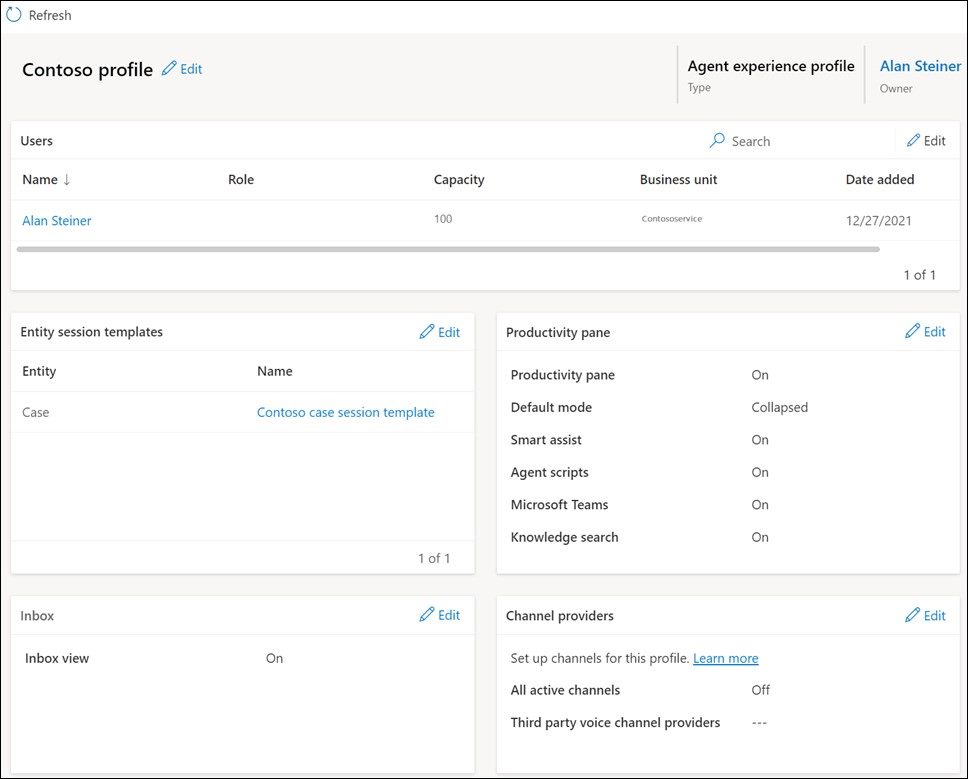The Gist
- Advanced integration. Microsoft Dynamics 365 streamlines CRM and customer interactions for heightened efficiency.
- AI-first approach. Built-in AI enhances every customer interaction, offering a competitive edge over traditional CCaaS.
- Omnichannel support. Dynamics 365 Contact Center ensures communication across all platforms.
The Microsoft Dynamics 365 Contact Center could stand out as a pivotal advancement set to redefine how businesses interact with their customers. Now widely available, this Contact Center as a Service (CCaaS) solution integrates with diverse CRM systems, leveraging the power of Azure and generative AI to deliver customer service capabilities.
Beyond enhancing traditional contact center functionalities, Microsoft's approach aims to unify customer interactions across digital channels and organizational workflows, setting a new standard for comprehensive, efficient customer experience management.
This article explores the transformative potential of Microsoft Dynamics 365 Contact Center and its implications for customer-facing businesses today.
Introduction to Microsoft Dynamics 365 Contact Center
Microsoft Dynamics 365 Contact Center is the latest addition to Microsoft's ecosystem that integrates advanced AI capabilities and Azure's cloud infrastructure in an attempt to empower businesses with scalable, efficient and personalized customer service operations.
Dale Mansour, global leader of TTEC Digital's Microsoft practice, told CMSWire that the fact that the AI strategy is built-in for agents is disruptive.
"The omnipresence of Copilot puts agent assistance in the form of generative AI seamlessly in the workflow of an agent handling calls, chats or SMS,” said Mansour. “Other existing CCaaS providers are working to figure out how to insert AI into the agent experience, whereas Microsoft started with AI first, and I believe this gives them an advantage.” As Copilot capabilities expand, Mansour explained, the agent — and therefore customers — will benefit directly.
CCaaS solutions like Dynamics 365 Contact Center are increasingly indispensable in today's customer-centric business environment, where seamless customer interactions across multiple channels are essential for building loyalty and driving growth. By centralizing communication channels — from traditional voice calls to digital interactions across email, chat, and social media — businesses can not only enhance customer satisfaction but also optimize operational workflows, according to Mansour.
“Omnichannel allows an organization to meet a customer where they are, which is pivotal to deliver the customer experience that is expected today,” Mansour said. “Providing the channels isn't the solution; it's the consolidation of all of that data for the agent handling the interaction that is key. If you can talk, text and email, but every interaction lives in a silo, it's frustrating.” Mansour said that using one platform for all, with all of the data in one place for the agent, is the advantage.
At its core, Dynamics 365 Contact Center enhances operational efficiency by automating routine tasks and providing real-time analytics insights. This enables organizations to allocate resources more effectively and deliver proactive, context-aware customer experiences. In addition, its integration with existing CRM systems ensures that businesses can leverage their current investments in customer data and workflows.
“The ability to leverage D365 Contact Center alongside an existing platform, with Copilot sourcing its agent assistance from external data (for example, a Salesforce KB) will provide a far superior agent experience in terms of CCaaS and 3rd party CRM integrations compared to a standard CTI (computer telephony integration) contact pop experience with no connected context,” said Mansour.
Nandakumar Sivaraman, VP of engineering and data & analytics practice lead at IT consultancy Bridgenext, told CMSWire that as it exists now, CCaaS may be a perfect fit for small and medium-sized contact centers.
"It offers several advantages, namely by enabling businesses to quickly pull together customer service platforms with seamless instance creation,” said Sivaraman. “From a big-picture perspective, rapid deployment can help reduce initial launch expenses and begin servicing customers faster."
Related Article: Balancing AI and the Human Touch in CCaaS Deployment
Overview of Dynamics 365 Contact Center
Dynamics 365 Contact Center integrates advanced AI capabilities and Nuance technology, all hosted on Microsoft's Azure cloud infrastructure. According to Microsoft officials, key features, capabilities and potential business impact include:
- Generative AI: Dynamics 365 Contact Center leverages generative AI to automate and personalize customer interactions across multiple channels. This includes intelligent self-service options and context-aware responses that adapt to customer needs in real-time.
- Nuance IVR Technology: Integrated IVR technology from Nuance enables natural, human-like interactions for customers, enhancing self-service capabilities and reducing agent workload.
- CRM System Compatibility: Designed to be CRM-agnostic, Dynamics 365 Contact Center integrates with various CRM systems and custom applications. This allows businesses to leverage existing customer data and workflows, ensuring a cohesive CX management strategy.
- Multichannel Support: Customers can engage via their preferred channels, including voice, SMS, chat, email and social media. This omnichannel approach not only increases accessibility but also enables consistent and personalized interactions across all touchpoints.
- Real-Time Analytics and Insights: AI-driven sentiment analysis, transcription and translation capabilities provide real-time insights into customer interactions. This empowers agents to deliver more informed responses and enables businesses to optimize service operations based on actionable data.
- Automation and Efficiency Tools: Features like Copilots for digital channels automate repetitive tasks such as email drafting and knowledge base searches. This streamlines workflows, improves agent productivity and enhances overall operational efficiency.
“Microsoft’s CCaS platform also offers robust security measures, which is imperative in an era where serious data breaches pose a real threat,” said Sivaraman. “The platform's architecture also makes it easily scalable, allowing businesses to efficiently manage demanding workloads and customer interactions as they grow. It even offers a range of integration capabilities, streamlining the process for reporting, surveys, and other contact center functions that are user-friendly.”
Sivaraman suggested that the platform’s intuitive design makes training staff easy and reduces the time and resources required to onboard new employees.
Related Article: The Troubled Migration to Cloud Contact Centers
Key Capabilities and Benefits of Dynamics 365 Contact Center
Dynamics 365 Contact Center’s platform also features pre-integrated Copilots specifically designed for digital channels. These Copilots enhance self-service experiences by providing context-aware responses and personalized interactions.
Liz Miller, VP and principal analyst at strategic advisory analyst firm Constellation Research, told CMSWire that the first thing that stands out is that this CCaaS solution is “Copilot-First” bringing generative AI to the fingertips of every agent to optimize their own performance while empowering them to create highly relevant and resonant communications with their customers.
"The solution touts a capacity to satisfy the needs of both customer and company as end users of customer service lines have expanded choice in where and how they want to engage — digital, voice, self-service, live agent — and companies have added choice and flexibility in how to connect to data and existing customer records of choice including CRM solutions,” said Miller. “But even with all that said, it is really Microsoft’s Copilot and the efficiencies it can deliver in assisting agents and customers that take center stage here."
Dynamics 365 Contact Center offers real-time IVR capabilities with natural language processing (NLP). This allows customers to interact naturally and receive immediate assistance, reducing wait times and improving service efficiency. In addition, the platform can intelligently route incoming requests to the most suitable agent based on predefined criteria such as skills, availability and customer context, in the Agent Experience Profile, as shown below. This ensures that each customer interaction is handled by the most qualified personnel, optimizing service quality and minimizing response times, Microsoft officials promise.

Using advanced AI tools, the platform performs real-time sentiment analysis to gauge customer emotions and preferences. It also offers translation and transcription capabilities to facilitate communication across language barriers. In addition, AI-driven task automation reduces agent workload by handling repetitive tasks such as data entry and knowledge base searches.
The platform also features generative AI-based real-time reporting, providing actionable insights into service performance, customer trends and operational efficiency. This enables service leaders to make informed decisions and optimize contact center operations for enhanced productivity and cost-effectiveness.
Sivaraman said that despite the benefits of Dynamics 365 Contact Center, there are clear opportunities for improvement.
"Platform administrators require more comprehensive statistics to monitor server status and performance. Enhancing these insights would enable better management and optimization of the contact center's operations,” said Sivaraman. “Additionally, as businesses evolve, their needs for contact center customization grow.”
Emphasizing that Microsoft’s platform offers minimal flexibility when it comes to customization, Sivaraman said that increasing customization options would allow businesses to tailor the platform to their specific requirements and workflows.
Shortening the Gap: Contact Centers in the Larger CX Conversation
Miller told CMSWire that recent contact center innovations have truly shaken up a market that had started to feel a bit commoditized.
“Now with new offerings from Microsoft and Salesforce," she said, "we are seeing the contact center start to be brought into the larger CX conversation and leaders will expect that the experiences, engagements, interactions and data from those moments will be more readily accessible across the organization as opposed to being segregated into narrow contact center stacks.”
One thing to note, Miller added, is the ease of integration that the Microsoft CCaaS solution promises, and "not just integration into the existing CX stack, but to the larger IT estate.
“Prebuilt connectors to business applications and native integrations with an organization’s existing data, this is a solution that is meant to start working straight from the box…the easy button with lots of connections to what already exists," she said.
It's an interesting long-term trend as it indicates that the contact center, once pushed out to operations with CIOs hoping the challenges of telephony and cross-channel communication and collaboration stayed segmented and controlled, is being brought closer to the company and the customer, shortening the distance between the CX front line and the enterprise bottom line, according to Miller.
Others note while Microsoft Contact Center opens up opportunities for some, it’s not necessarily the end-all-be-all solution for every enterprise.
Prasanna Arikala, CTO at conversational AI platform provider Kore.ai, told CMSWire that the Microsoft Dynamics 365 Contact Center benefits businesses already within the Microsoft ecosystem, providing a unified and efficient customer experience.
"Enterprises today prefer to integrate best-of-breed technologies for their unique needs and are cautious about the risks of vendor lock-in. Additionally, there are concerns about dependency and ongoing cost implications of LLMs from the major players," said Arikala. "While Microsoft's CCaaS solution is a strong addition, it aligns with current market trends rather than fundamentally reshaping the landscape."
Final Thoughts on Microsoft Dynamics 365 Contact Center
Microsoft's Dynamics 365 Contact Center, by combining advanced features such as generative AI, omnichannel support and real-time analytics with the flexibility to work with various CRM systems, positions Microsoft as a formidable player in the contact center industry.
As businesses prioritize exceptional customer experiences, Dynamics 365 Contact Center stands poised to reshape the realm of customer engagement, offering businesses the tools they need to thrive in an increasingly digital and customer-centric marketplace.
